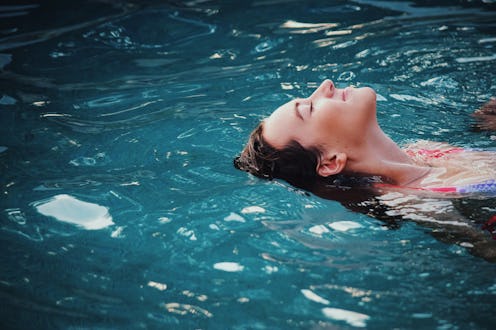Life
What Vacations Do To Your Body

Americans aren't exactly known around the world as people who take vacations on a regular basis. In many European countries like France and Germany, adults generally take about six weeks off every year, whereas an American employee, on average, will allow five paid vacation days to go to waste each year. In 2014, the number of leftover vacation days in the U.S. reached all-time high in 40 years. In fact, more than half of Americans in the year of 2015 didn't take a vacation at all. This isn't necessarily because our bosses aren't letting us escape to the beach or because we're afraid to spend money on a holiday. Rather, our workaholic culture has wired us to believe that the more we work, the farther ahead we'll get in our career.
Common sense has to prevail at some point, though. Think about how amazing you feel after you take some time off of work. You're less stressed, your skin starts to glow, and you even find it easier to interact with your co-workers when you get back into the swing of things. It's not just in our heads, though. Vacation can do wonders for the body, and science has proven this to be true. Countless studies have been conducted on vacationing adults all over the world, and the consensus is pretty much the same every time: taking regular vacations is necessary for maintaining good health. So don't just talk about flying off to Hawaii with your besties in 2017. Make it a reality, because science is begging you to relax.
Here are six things vacations do to your body — and why you should take one, stat.
It Will Increase Your Happiness (If It's The Right Length)
Everybody knows that taking a vacation is something that makes you happy, or at least happier than you were before. But don't make the mistake of thinking that any kind of vacation equals smiley stress relief. According to research conducted by a Finnish university, the length of your vacation makes a difference in how happy you become.
Researchers followed around 54 different individuals on their holidays, studying their satisfaction levels and taking notes on the duration of their vacation. They found that you don't just keep shedding stress as you spend more and more time on the beach. Instead, they found that happiness peaks after about eight days and subsequently declines. In other words, just a little over a week is apparently the perfect amount of time needed to clear your head and boost your spirits. You've got enough time to unpack and get acquainted with the surrounding area, and you also have a day to recover at the end of your trip, which you can use to prepare for your first day back to work.
It Will Decrease Your Risk For Heart Disease
Spanning over two decades, the Framingham Heart Study found that women who only vacationed once every six years (or less) were eight times more likely to be diagnosed with coronary heart disease than those who took off work at least twice a year. A similar study found that, out of 12,000 men, those who took vacations every year were 32 percent less likely to battle heart disease than those who never cashed in their vacation days. Clearly, more vacation time leads to a healthier heart.
It Will Lower Your Levels Of Stress
Again, pretty intuitive — but now you know it's proven. The reason you feel so relaxed and gooey after a few days of an unplugged absence is because you're harboring much less stress and anxiety. A Canadian study in 2009 proved that even the most basic of leisure activities decreased stress in a group of nearly 900 attorneys. Researchers claim that taking a vacation generally promotes inner peace and improves subjective wellbeing. Other studies have shown that people come back to their daily lives after a vacation with less negative feelings and depressive symptoms. Simply resting the brain has the power to reset your emotional health and encourage you to gain a fresh perspective on life.
It Will Motivate You To Forge Deeper Emotional Connections
Apparently, taking a vacation promotes something in your brain called the "crescive bond," which is used to foster meaningful and lasting connections with people in your community. By relaxing and unwinding, you're encouraging your mind to tap into a greater shared experience with others. Next thing you know, you're bickering less with your partner and feeling more grateful for the relationship with your mom than ever before.
This is why it pays off tremendously to take a vacation with your friends or family. Sharing all those happy memories will bring you closer together and make you appreciate one another, even if planning the whole outing has its stressful moments here and there.
It Will Improve Your Creativity
When you allow your brain to chill out for a little while, you rest the task-focused part of your mind that's usually in overdrive when you're at work. Daniel J. Levitin, the director of the Laboratory for Music, Cognition and Expertise at McGill University, told the New York Times that this state usually leads to "our moments of greatest creativity and insight." Relaxation could be the ticket you need to be more innovative and thus excel when you get back to the office. Which brings us to...
It Will Make You Better At Your Job
Furthermore, studies have shown that employees who come back to the office after a juicy vacation are more focused and easier to work with. At the accounting firm Ernst & Young, an internal study showed that for every 10 extra hours of vacation time an employee took, their performance review the next year was eight percent higher. Keep up that regular vacation time, and all that relaxation just might help you get ahead in your career.
Images: Unsplash; Fotolia